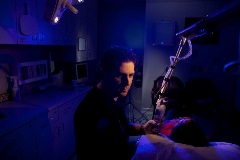Study reports 730-nm titanium sapphire laser is safe and effective for the treatment of café-au-lait macule birthmarks.
 Wausau, WI (March 14, 2024) – Solitary café-au-lait macules (CALMs) are common birthmarks and pose a significant challenge in patients with darker skin phototypes due to limited therapeutic options. This study is the first to report that the 730-nm titanium sapphire laser is a safe and effective treatment option for treating CALMs in all skin types and a wide range of ages.
Wausau, WI (March 14, 2024) – Solitary café-au-lait macules (CALMs) are common birthmarks and pose a significant challenge in patients with darker skin phototypes due to limited therapeutic options. This study is the first to report that the 730-nm titanium sapphire laser is a safe and effective treatment option for treating CALMs in all skin types and a wide range of ages.
The study, led by Paul M. Friedman, MD, is titled, “The 730 nm picosecond titanium sapphire laser for treatment of café-au-lait macules in all skin types.” The clinical report, published in Lasers in Surgery and Medicine (LSM), the official journal of the American Society for Laser Medicine and Surgery, Inc. (ASLMS), was selected as the March 2024 Editor’s Choice.
“The removal of CALMs in patients with darker skin phototypes poses a significant challenge due to limited available therapeutic options and increased risk of adverse effects, including further dyspigmentation,” Friedman said. “We present the first case series utilizing a 730-nm picosecond titanium sapphire laser for the treatment of CALMs in all skin types. This is also the first reported treatment of CALMs in FST V-VI patients.”
The study performed a retrospective review of patients treated at a single institution between April 2021 and December 2023. Clinical photographs were graded by three outside board-certified dermatologists using a 5-point visual analog scale.
“Our study further supports prior studies, which have found that café-au-lait macule birthmarks with smooth-bordered “coast of California” morphology have a poor response to laser therapy as compared to those with jagged or ill-defined bordered “coast of Maine” morphology,” Friedman commented. “Finally, this manuscript is also valuable in demonstrating the safety and efficacy of treating facial CALMs in infants and preschool-aged children with this 730-nm picosecond technology. Early intervention is paramount as these lesions tend to be socially and psychologically distressing to patients with facial distribution.”
Paul M. Friedman, MD, board-certified by the American Board of Dermatology, is the director of Dermatology & Laser Surgery Center of Houston. Dr. Friedman is a clinical assistant professor at the University of Texas Medical School, department of dermatology, and a clinical assistant professor of dermatology at the Weill Cornell Medical College, Houston Methodist Hospital. Dr. Friedman is a fellowship director for the ASDS-accredited cosmetic dermatologic surgery fellowship training program and also serves as faculty for the Procedural Dermatology Fellowship at MD Anderson Cancer Center. Dr. Friedman has been recognized as a leading physician and researcher in the field and has also been involved in the development of several new laser systems and therapeutic techniques now commonly used throughout the world.
Editor’s Choice is an exclusive article published in LSM, the official journal of ASLMS. View the complete manuscript.
The American Society for Laser Medicine and Surgery, Inc. (ASLMS) is the largest multidisciplinary professional organization dedicated to the development and application of lasers and related technology for health care applications. ASLMS promotes excellence in patient care by advancing biomedical application of lasers and other related technologies worldwide. ASLMS membership includes physicians, surgeons, nurses, and allied health professionals representing multiple specialties, physicists involved in product development, biomedical engineers, biologists, industry representatives and manufacturers. For more information, visit aslms.org.